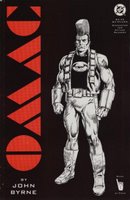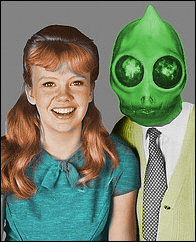Always remember...
No look-see at the career of John Byrne would be complete without mentioning one of the things he is known for, the revamping of a character. For years, John Byrne has been one of the few regular "Go To Guys" a company called when they wanted to refresh a title.
In Fantastic Four, John Byrne successfully proved to everyone that he could not only draw, but write and reinvigorate a franchise title. Known by DC/Marvel fans at the time as being primarily an artist, John Byrne tackled the FF with enthusiasm, turning in incredible art and very good stories. The FF run was 90% hit and 10% miss in my opinion, which is much better than almost any creative team can boast. Perhaps one of the better changes to the group dynamic was the revamp of Sue Storm, the Invisible Girl.
write and reinvigorate a franchise title. Known by DC/Marvel fans at the time as being primarily an artist, John Byrne tackled the FF with enthusiasm, turning in incredible art and very good stories. The FF run was 90% hit and 10% miss in my opinion, which is much better than almost any creative team can boast. Perhaps one of the better changes to the group dynamic was the revamp of Sue Storm, the Invisible Girl.
Just a few issues after appearing as a guest on a television show reaffirming her contentment to be a housewife and fourth wheel of the group not defined by society's labels, Sue Storm was mind-controlled by the Psycho-Man to attack her team mates. After she got revenge for the Psycho-Man's brain-rape, Sue Storm publicly changed her FF code name to the Invisible Woman. That was a great move on John's part, in allowing Sue Storm to evolve as a character it gave her and the team a new dynamic and plenty of opportunities for fresh stories.
It was also Byrne, if I recall correctly, who stated what was previously left to perceptive fans to imagine that Ben Grimm would never be successfully cured of being the Thing because of his deep insecurities about being human.
There were a few revamps that were not as successful.  The New Universe title The Star Brand was doomed by the powers that be at Marvel by the time John Byrne tackled it. The creative mess was clearly beyond his ability to repair given the time left to him and lack of corporate support.
The New Universe title The Star Brand was doomed by the powers that be at Marvel by the time John Byrne tackled it. The creative mess was clearly beyond his ability to repair given the time left to him and lack of corporate support.
John Byrne's most successful and well known reboot was of course, Superman.
The Superman reboot is intimately tied into the Crisis On Infinite Earths attempt by DC to refresh their tired and continuity-heavy stable of characters. A reader had to have a nearly encyclopedic knowledge of DC to understand what was going on in a title. While that made for a rich, shared universe, it greatly limited the characters.
attempt by DC to refresh their tired and continuity-heavy stable of characters. A reader had to have a nearly encyclopedic knowledge of DC to understand what was going on in a title. While that made for a rich, shared universe, it greatly limited the characters.
By the end of CoIE, Superman was handed over to John Byrne, who must have pitched the pitch of his life to DC. Reintroduced in the 1986 Man of Steel mini series, Superman was depowered and had his origin retold. No longer would he juggle planets or reignite stars with a stern look.
Other than the depowering, there were three story elements that most turned the Superman character on its head.
- The first was that Krypton was no longer the logical, scientific semi-utopia that it had been portrayed as since 1939. The Byrne Krypton was cold, lifeless and sterile. The people were disconnected from society and one another, and they could be considered walking dead long before the planet was destroyed by runaway science.
- The second change was the shift in the concept of the Clark/Superman persona. Since his beginning, the real person who was the Superman was Kal-El, Last Son of Krypton. Clark Kent was the mask that Superman wore to mingle with the mortals. Pre-CoIE, Superman started as Superbaby, then continued a career as Superboy until he moved to the big city, and took on the mantle of a Superman. Kal-El had always been 'super' and didn't know how to be human. He faked it best he could, but all he could accomplish was a close simulation.
- The third story element was a shocker.
 In a very exciting multi-parter Superman killed some pocket universe Kryptonian criminals who had killed the population of that alternate Earth. Fans that believed that Superman never killed had forgotten that most Golden Age heroes did indeed kill their enemies and the Silver Age ones often stood by while the villains died in their own traps. But for about 20 years Superman was known in the comics as having a personal code that he never killed. This made him unique among his peers as even in the late-60's and during the 70's, the other heroes occasionally killed in self-defense.
In a very exciting multi-parter Superman killed some pocket universe Kryptonian criminals who had killed the population of that alternate Earth. Fans that believed that Superman never killed had forgotten that most Golden Age heroes did indeed kill their enemies and the Silver Age ones often stood by while the villains died in their own traps. But for about 20 years Superman was known in the comics as having a personal code that he never killed. This made him unique among his peers as even in the late-60's and during the 70's, the other heroes occasionally killed in self-defense.
 It's a testament to John Byrne's Superman work that it was more than a decade until DC decided to revamp the character and his supporting universe again.
It's a testament to John Byrne's Superman work that it was more than a decade until DC decided to revamp the character and his supporting universe again.John Byrne also tackled DC's OMAC, which was nearly forgotten after having been through some horrible reinventions and aborted revivals by various creative teams. Rumor had it that Jack Kirby was not happy with Byrne's treatment of the character but then, Kirby was also kind of cranky in those days. I really enjoyed it and the series is always one I re-read every 6 months or so for the pure enjoyment of it.
I enjoyed the theme of an alternating time loop that introduced a reboot while also respecting the work of Jack Kirby and others who had gone before.































Sure he's had success in the past, but his Doom Patrol reboot made me cry.
ReplyDeleteJohn Byrne's Doom Patrol:
ReplyDelete--hurt my feelings
--wounded my pride
--stung my eyes
--offended my sensibilites
--damaged my relationships with women
--made my *father* cry
--killed my pet hamster
--gave me tinnitus in my left ear
--threw my ROM, Spaceknight action figure out the window, screaming "I'm commiting suicide!"
--stole $18 out of my sock drawer
--coughed on my dinner plate
--peed on me, while I was sleeping (or maybe I did that)
--didn't call, didn't write, worried me half to death, what was it thinking!?
--raped me
Fans are bizarre. Any internet discussion of John Byrne has to revolve around Doom Patrol or Spider-Man or that time he broke your heart at Comicon. His awesome work on FF and Superman gets barely a mention, unless it's from deranged Silver-Agers darkly muttering about how he raped Streaky the Super-Cat. It's nice to see some appreciation for the Good Byrne every now and then. Good post, Sleestak.
ReplyDeleteYou MIGHT say that John Byrne MAY be a blowhard, MAY be a maniacal, egotistical, woman-hating, baby-drowning, dog-kicking, monkey-brain-eating, homonculous...I dunno.
ReplyDeleteYOU might say that.
But not me.
That's NOT for me to say.
What John Byrne IS, for me...is a creative well (who, may be drying up...or just needs to whip out his creative diving rod to find a rich spring of clean, pure, inspiration)...and, I can testify...
...WAS NICER THAN ANYONE could be to myself at a con waaaay back when I was an early teen (early 80's).
There I was at a NYC comic-con. John's first issue of Alpha Flight had come out recently, and, with some pencilled pages in hand, I wanted to ask his opinion.
He had just finished a Q & A session (Howard Chaykin was up next to dish over American Flagg) and I must have seemed hesitant, because JB approached ME.
He noticed the pages and asked to take a look (at my clumsy attempts to draw some cool, wicked-ass DR STRANGE panels).
He looked at each page, took his time, and when he handed them back, with a SMILE, told me that I had real promise, but needed to work on some things, (since it must have been obvious to him that I had NO idea how these things were actually MADE).
He signed my copy of F.F. # 232 (his first full-creator issue) and Alpha Flight # 1 and wished me luck.
(I'm a professional illustrator and writer now, and even dabbled in comics for a few years...so he was right)
So, at this point, until I bump into him and he kicks me in the groin...I have nothin' bad to say.
And even AFTER the groin kick...I'd call it even.
That said...his throwing out of ALL Doom Patrol history made me sad.
I really LIKED the D.P.
Oh well...
~P~
I think Mr. Byrne is an interesting creator, within the group of creators that have some really good work, but won't really be written in comic book history as geniuses (like an Alan Moore, a Will Eisner, a Jack Kirby).
ReplyDeleteAside from all of the controversial things Byrne says that would lose him friends and allies in any sphere, not just comics, I think the main problem comics fans have with him is the palpable, pointed disdain with which he produces intentionally vacuous comics--disdain pointed straight at the modern fan.
ReplyDeleteByrne's aesthetic, his apparent vision of what superhero comics "ought" to be limited to, is fueled by antipathy for creators and fans who want to use superhero concepts for different kinds of stories. What they find liberating he seems to regard as betrayal of the source material; what they see as the reality of an adult readership he wants no part of. Byrne seems to be saying, if you want "grown up" post-modern superheroes, you have no business reading these things anymore. I think his detractors pick up on Byrne's evident belief that they're illegitimate fans championing debased comics. And they hate him for it.
Personally, I think the Byrne that comes across in interviews sounds like a grade A asshole with clear emotional problems, and I vastly prefer the Alan Moores and Grant Morrisions of the world to Byrne's work (which I utterly adored as a kid.) But somewhere in there, past all of that, Byrne has a point.
"Farzio said..."
ReplyDeleteI'll address more on those concepts you spoke about with a display of a few of his works in a bit, as sleepiness allows. It will of course be light on content, I'll let you all take what you will from it.
ALPHA FLIGHT. That's all I'm saying.
ReplyDelete